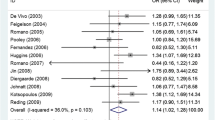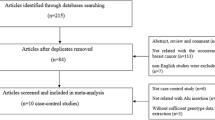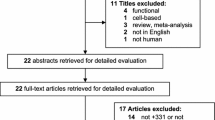Abstract
Insofar as altered estrogen receptor-progesterone receptor (PR) expression contribute to breast cancer pathogenesis, previous studies examined the association of genetic variation in PR gene (PGR) with breast cancer, but with mixed outcome. We evaluated the association between PGR variants, and breast cancer and associated features. A retrospective case-control study involving 183 female breast cancer patients, and 222 control women. PGR genotyping was done by real-time PCR. Minor allele frequencies of rs1042838, rs590688, and rs10895068 PGR gene polymorphisms were significantly higher in breast cancer patients compared to controls. Patients carrying rs1042838 G/T, rs590688 C/C, and rs10895068 G/A genotypes had higher risk of breast cancer, while carriage of rs3740753 G/G genotype was associated with marginal reduction in breast cancer risk. In addition, carriage of rs1042839, rs3740753, and rs10895068 minor allele was associated with Her2 status, while rs3740753 and rs10895068 were associated with effective hormone replacement therapy. Furthermore, carriage of rs10895068 minor allele in breast cancer women were also associated with age at first pregnancy, hormone receptor (RH) status, and previous use of oral contraceptives. PGR haploview analysis documented moderate-strong linkage disequilibrium (non-random association of alleles at different loci) between 7 of the 8 tested PGR SNPs, thus allowing construction of 7-locus PGR haplotypes. Two haplotypes, ATGCCGA and GTGCCGA, both containing rs590688, were positively associated with breast cancer, thus assigning a breast cancer-susceptible nature to these haplotypes. PGR rs1042838, rs590688, and rs10895068, and ATGCCGA and GTGCCGA haplotypes are related with increased breast cancer susceptibility in Tunisian women.

Similar content being viewed by others
References
Fan L, Goss PE, Strasser-Weippl K (2015) Current status and future projections of breast cancer in Asia. Breast Care (Basel) 10:372–378. https://doi.org/10.1007/s10552-014-0491-2
Abdulrahman GO Jr, Rahman GA (2012) Epidemiology of breast cancer in Europe and Africa. J Cancer Epidemiol 2012:915610. https://doi.org/10.1155/2012/915610
Mojgan H, Massoud H, Ahmad E (2012) ERCC1 intron 1 was associated with breast cancer risk. Arch Med Sci 8:655–658. https://doi.org/10.5114/aoms.2012.30289
Gallegos MP, Figuera LE, Ramos MC, Salas E, Puebla AM, Peralta V, Gaecia JE, Davalos IP, Zúñiga GM (2014) The association between the 844ins68 polymorphism in the CBS gene and breast cancer. Arch Med Sci 10:1214–1224. https://doi.org/10.5114/aoms.2014.47830
Gómez Flores-Ramos L, Escoto-De Dios A, Puebla-Pérez AM, Figuera-Villanueva LE, Ramos-Silva A, Ramírez-Patiño R, Delgado-Saucedo JI, Salas-González E et al (2013) Association of the tumor necrosis factor-alpha –308G>A polymorphism with breast cancer in Mexican women. Genet Mol Res 12:5680–5693. https://doi.org/10.4238/2013
Xu YL, Sun Q, Shan GL, Zhang J, Liao HB, Li SY, Jiang J, Shao ZM et al (2012) A case-control study on risk factors of breast cancer in China. Arch Med Sci 8:303–309. https://doi.org/10.5114/aoms.2012.28558
Perou CM, Sorlie T, Eisen MB, van de Rijn M, Jeffrey SS, Rees CA, Pollack JR, Ross DT et al (2000) Molecular portraits of human breast tumours. Nature 406:747–752
Nyante SJ, Gammon MD, Kaufman JS, Bensen JT, Lin DY, Barnholtz-Sloan JS, Hu Y, He Q, Luo J, Millikan RC (2015) Genetic variation in estrogen and progesterone pathway genes and breast cancer risk: an exploration of tumor subtype-specific effects. Cancer Causes Control 26:121–131. https://doi.org/10.1007/s10552-014-0491-2
Eiró N, Fernandez-Garcia B, Vázquez J, Del Casar JM, González LO, Vizoso FJ (2015) A phenotype from tumor stroma based on the expression of metalloproteases and their inhibitors, associated with prognosis in breast cancer. Oncoimmunology 4:e992222
Hawkins RA, White G, Bundred NJ, Dixon JM, Miller WR, Stewart HJ, Forrest AP (1987) Prognostic significance of oestrogen and progestogen receptor activities in breast cancer. Br J Surg 74:1009–1013
Savouret JF, Misrahi M, Milgrom E (1990) Molecular action of progesterone. Int J BioChemiPhysics 22:579–594
Graham JD, Clarke CL (2002) Expression and transcriptional activity of progesterone receptor A and progesterone receptor B in mammalian cells. Breast Cancer Res 4:187–190
Mani SK, Oyola MG (2012) Progesterone signaling mechanisms in brain and behavior. Front Endocrinol (Lausanne) 3:7. https://doi.org/10.3389/fendo.2012.00007
Fisher B, Redmond C, Fisher ER, Caplan R (1988) Relative worth of estrogen or progesterone receptor and pathologic characteristics of differentiation as indicators of prognosis in node negative breast cancer patients: findings from National Surgical Adjuvant Breast and Bowel Project Protocol B-06. J Clin Oncol 6:1076–1087
Mote PA, Bartow S, Tran N, Clarke CL (2002) Loss of co-ordinate expression of progesterone receptors A and B is an early event in breast carcinogenesis. Breast Cancer Res Treat 72:163–172
Gabriel CA, Mitra N, Demichele A, Rebbeck T (2013) Association of progesterone receptor gene (PGR) variants and breast cancer risk in African American women. Breast Cancer Res Treat 139:833–843. https://doi.org/10.1007/s10549-013-2592-0
Pooley KA, Healey CS, Smith PL, Pharoah PD, Thompson D, Tee L, West J, Jordan C et al (2006) Association of the progesterone receptor gene with breast cancer risk: a single-nucleotide polymorphism tagging approach. Cancer Epidemiol Biomark Prev 15:675–682
Pearce CL, Hirschhorn JN, Wu AH, Burtt NP, Stram DO, Young S, Kolonel LN, Henderson BE et al (2005) Clarifying the PROGINS allele association in ovarian and breast cancer risk: a haplotype-based analysis. J Natl Cancer Inst 97:51–59
Gold B, Kalush F, Bergeron J, Scott K, Mitra N, Wilson K, Ellis N, Huang H et al (2004) Estrogen receptor genotypes and haplotypes associated with breast cancer risk. Cancer Res 64:8891–8900
Johnatty SE, Spurdle AB, Beesley J, Chen X, Hopper JL, Duffy DL, Chenevix-Trench G (2008) Progesterone receptor polymorphisms and risk of breast cancer: results from two Australian breast cancer studies. Breast Cancer Res Treat 109:91–99
Fernandez LP, Milne RL, Barroso E, Cuadros M, Arias JI, Ruibal A, Benitez J, Ribas G (2006) Estrogen and progesterone receptor gene polymorphisms and sporadic breast cancer risk: a Spanish case control study. Int J Cancer 119:467–471
Romano A, Delvoux B, Fischer DC, Groothuis P (2007) The PROGINS polymorphism of the human progesterone receptor diminishes the response to progesterone. J Mol Endocrinol 38:331–350
Clendenen T, Zeleniuch-Jacquotte A, Wirgin I, Koenig KL, Afanasyeva Y, Lundin E, Arslan AA, Axelsson T et al (2013) Genetic variants in hormone-related genes and risk of breast cancer. PLoS One 8:e69367. https://doi.org/10.1371/journal.pone.0069367
Diergaarde B, Potter JD, Jupe ER, Manjeshwar S, Shimasaki CD, Pugh TW, Defreese DC, Gramling BA et al (2008) Polymorphisms in genes involved in sex hormone metabolism, estrogen plus progestin hormone therapy use, and risk of postmenopausal breast cancer. Cancer Epidemiol Biomark Prev 17:1751–1759. https://doi.org/10.1158/1055-9965.EPI-08-0168
Reding KW, Li CI, Weiss NS, Chen C, Carlson CS, Duggan D, Thummel KE, Daling JR, Malone KE (2009) Genetic variation in the progesterone receptor and metabolism pathways and hormone therapy in relation to breast cancer risk. Am J Epidemiol 170:1241–1249. https://doi.org/10.1093/aje/kwp298
Spurdle AB, Hopper JL, Chen X, McCredie MR, Giles GG, Venter DJ, Southey MC, Chenevix-Trench G (2002) The progesterone receptor exon 4 Val660Leu G/T polymorphism and risk of breast cancer in Australian women. Cancer Epidemiol Biomark Prev 11:439–443
Gaudet MM, Milne RL, Cox A, Camp NJ, Goode EL, Humphreys MK, Dunning AM, Morrison J et al (2009) Five polymorphisms and breast cancer risk: results from the Breast Cancer Association Consortium. Cancer Epidemiol Biomark Prev 18:1610–1616. https://doi.org/10.1158/1055-9965
Zhang B, Beeghly-Fadiel A, Long J, Zheng W (2011) Genetic variants associated with breast-cancer risk: comprehensive research synopsis, meta-analysis, and epidemiological evidence. Lancet Oncol 12:477–488. https://doi.org/10.1016/S1470-2045(11)70076-6
De Vivo I, Hankinson SE, Colditz GA, Hunter DJ (2004) The progesterone receptor Val660-->Leu polymorphism and breast cancer risk. Breast Cancer Res 6:R636–R639
Huggins GS, Wong JY, Hankinson SE, De Vivo I (2006) GATA5 activation of the progesterone receptor gene promoter in breast cancer cells is influenced by the +331G/A polymorphism. Cancer Res 66:1384–1390
Feigelson HS, Rodriguez C, Jacobs EJ, Diver WR, Thun MJ, Calle EE (2004) No association between the progesterone receptor gene +331G/A polymorphism and breast cancer. Cancer Epidemiol Biomark Prev 13:1084–1085
Yu KD, Chen AX, Shao ZM (2010) No association between a progesterone receptor gene promoter polymorphism (+331G>A) and breast cancer risk in Caucasian women: evidence from a literature-based meta-analysis. Breast Cancer Res Treat 122:853–858
Acknowledgements
We thank Dr. Sami Limem for this constant help and support. The study was partially supported by a grant from the Islamic Development Bank (Jeddah, Saudi Arabia).
Author information
Authors and Affiliations
Contributions
RMG Specimen processing, drafting of manuscript. MAA Genotyping. BHE Genotyping. HHJ Data analysis. SZ Patient selection and referral. HB Patient selection and referral. FH Patient selection and referral. TM Control women selection and referral. WYA Project leader; finalizing analysis and manuscript.
Corresponding author
Ethics declarations
Conflict of Interest
The authors declare that they have no conflict of interest.
Rights and permissions
About this article
Cite this article
Ghali, R.M., Al-Mutawa, M.A., Ebrahim, B.H. et al. Progesterone Receptor (PGR) Gene Variants Associated with Breast Cancer and Associated Features: a Case-Control Study. Pathol. Oncol. Res. 26, 141–147 (2020). https://doi.org/10.1007/s12253-017-0379-z
Received:
Accepted:
Published:
Issue Date:
DOI: https://doi.org/10.1007/s12253-017-0379-z




